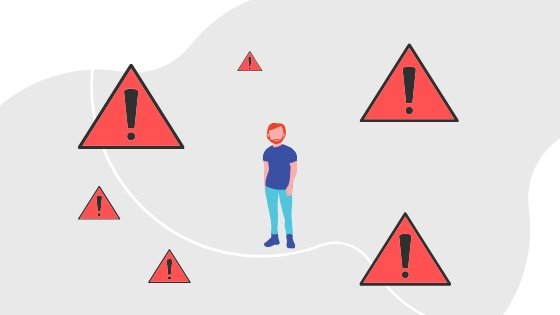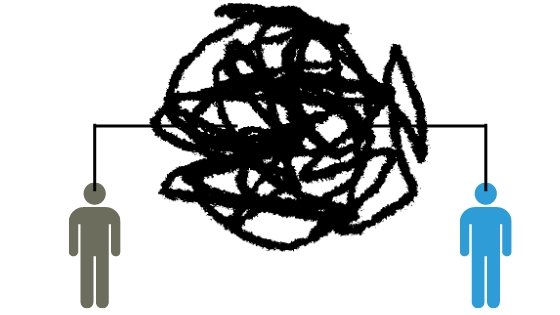The Gift Of Fear Summary by Gavin De Becker teaches you why fear is a fantastic gift and how fear combined with intuition can help predict perpetrators before they attack you and make you a victim.
Who Should Read The Gift Of Fear Summary?
- Security persons like security guards.
- People who are concerned about their safety.
- Those who want to avoid occupational hazards.
- Victims of any crime.
- All those who don’t take responsibility for themselves and the people around them.
- All those who wish to learn about fear and violence in general.
Purchase this book on Amazon: Hardcover | Paperback | Audiobook
The Gift Of Fear Summary [PDF]
In this summary, I’ve shared all the lessons I learned from each chapter of this book.
So without further ado, let’s dive in.
Best Tools for Bibliophiles
- Listen to your Favorite Books on The Go: Try Audible and Get Up To 2 Free Audiobooks | Get 3 Free Audiobooks
- Read over 2 million e-books on any device: Sign up for 30 days free trial of Kindle Unlimited and read your favorite titles.
- Get free 2-day shipping of your favorite books and stream premium TV shows on Amazon Prime: Sign up for 30 days free trial of Amazon Prime.
- I use Notion to take reading notes, plan everything, and run all my businesses. (Notion is my Second Brain 🤯): Get Notion for free for personal use (paid for teams/businesses)
Chapter 1: In The Presence Of Danger

We all are surrounded by danger most of the time, but we don’t see it.
Yes, it’s true.
But are we prepared for it?
The author says we have an inbuilt signal mechanism called fear, which predicts future hazards.
We can prevent violent crimes by considering these signals that our mind or body gives us.
Have you ever had that discomforting feeling that something wrong is about to happen? Congratulations, that’s your danger mechanism at work, and it’s doing a great job.
We depend so much on technology like CCTV cameras to see and predict any crime or violence these days.
We trust our security guards. We trust the police.
But is all this enough to ensure our safety?
The author suggests that we should take responsibility for our safety.
Instead of relying on security officials, we must learn to sense danger and avoid it.
We should learn how to recept the subtle signs that a perpetrator gives before committing the crime.
There is a myth that violent actions happen out of nowhere.
Using our internal mechanisms like intuition, we can avoid becoming victims.
The thing is:
No matter how civilized we get, the violence will be there.
Violence runs through all the species on this planet.
I know it’s sad, but that’s the reality.
The author gives an analogy that criminals are like predators. Predators often catch their prey off-guard.
Unlike animal predators, human predators don’t desire food; it’s plenty already.
Human predators often sought power.
Gavin argues that it’s because we think we can’t predict crimes before happening that we avoid the duty of preventing violent behaviors.
The human violence we abhor and fear the most, that which we call “random” and “senseless,” is neither. It always has purpose and meaning, to the perpetrator, at least.
Gavin De Becker, The author of The Gift Of Fear
Chapter 2: The Technology Of Intuition

You must learn how to embrace the supernatural power of intuition.
Intuition or gut feeling is often under-estimated.
Let’s say you’re walking on an empty street at night, and all of a sudden, your gut tells you that a stranger is following you.
What would you do in that case?
At first, most people would think that “it’s nothing, it’s just a random feeling.”
Is this what you should do?
Not really.
Whenever your intuition tells you that something is fishy or strange, you should embrace it and explore it further instead of suppressing it.
What most people do is that they seek approval from the outside. Sometimes, they try to find logic and ignore the unimportant details that don’t fit their reason.
For example, people trust their dog’s instinct more than themselves.
Gavin says that our judgments often come in the way of intuition.
Animals like dogs trust their instincts or gut feelings and act without any second thoughts.
Contrary to this, humans spend a hell lot of mental energy questioning their instincts.
But it has been found many times that our guts often help us avoid great dangers.
Instead of seeking approval from the outside, we should explore further what our instincts are trying to tell us.
Don’t think of your instincts or intuition as some irrational thoughts.
Even men of science rely on intuition, both knowingly and unknowingly. The problem is, we discourage them from doing it.
Gavin De Becker, The author of The Gift Of Fear
Please don’t ignore it whenever you see a dream and feel like you had a hunch. Explore it further.
Intuition is a fantastic defense technology. Use it.
Best Tools for Bibliophiles
- Listen to your Favorite Books on The Go: Try Audible and Get Up To 2 Free Audiobooks | Get 3 Free Audiobooks
- Read over 2 million e-books on any device: Sign up for 30 days free trial of Kindle Unlimited and read your favorite titles.
- Get free 2-day shipping of your favorite books and stream premium TV shows on Amazon Prime: Sign up for 30 days free trial of Amazon Prime.
- I use Notion to take reading notes, plan everything, and run all my businesses. (Notion is my Second Brain 🤯): Get Notion for free for personal use (paid for teams/businesses)
Chapter 3: The Academy Of Prediction

According to Gavin, we’ve all been in the academy of prediction ever since we were born.
Why?
It’s because we automatically learn about human behaviors as we grow up.
We can spot and predict violent actions by picking up specific signals.
Predicting violent behavior isn’t a mystery. We are capable enough to predict it.
To understand this correctly, you must accept that violence can happen anywhere.
For example, it can happen among animals, among humans, among anyone.
It’s people who perform violent acts.
So if you learn human behavior, you can predict the violent behavior of a human predator.
The thing is:
We all have violent tendencies. It’s just a matter of perspective and circumstances.
For example, if someone tries to hurt your loved one, you could show violent behavior.
The problem is:
Most people perceive human predators as a different breed; some call it a ‘criminal mind.’
But the truth is, those who commit crimes are people too. They also look like us. They are not much different.
I don’t believe in such a thing as the criminal mind. Everyone’s mind is criminal; we’re all capable of criminal fantasies and thoughts.
Karl Menninger
Chapter 4: Survival Signals
As we talked earlier in this summary, you must learn to pick the signal that a predator gives unconsciously before committing any crime.
Below are a few techniques that Gavin talks about in this book that predators use to trick you.
Forced Teaming

Forced Teaming is a technique people use to build a common ground or rapport between two or more persons.
People use this technique for so many reasons. But most of them are self-serving, Gavin says.
Strangers or predators use it to build trust with their targets quickly.
Charm and Niceness
We must learn and then teach our children that niceness does not equal goodness. Niceness is a decision, a strategy of social interaction; it is not a character trait.
Gavin De Becker, The author of The Gift Of Fear
If you have watched the Lucifer show on Netflix, you might have observed that Lucifer had a charming personality, using which he could easily win over women.
Sometimes predators play nice to try to build trust with their target.
You must understand that people play nice for a myriad of selfish reasons.
Charm and niceness are just tools for predators.
Be aware, and look if the other person you are talking to is trying to win you using these same tools or not.
The reception of these subtle signals might even save your life someday.
Giving Too Much Detail
Sometimes predators get so lost in justifying themselves that they start giving you so many details — more than needed.
That’s a sign that something is wrong.
Because truth doesn’t need to be justified so much.
For example, if someone is lying to you, he’ll try to fill in the gaps in the statement he uses, making himself look credible.
If you’re having nagging feelings like fear, hesitation, etc., while talking to a stranger or a person, look for these signals, the predator might be using these same techniques.
Chapter 5: Imperfect Strangers
All the people you know now were strangers one day.
Strangers become people and friends when you trust them.
And you trust people when you have enough real-life data about them.
When a stranger ticks all the trust parameters, you consider him normal and let your guard down a little. This is how you make predictions about a stranger.
Gavin says that the best way to predict a person’s behavior is by finding common ground between you and the other person.
That way, you’ll be better able to predict the other person’s tendencies and avoid a dangerous outcome.
Chapter 6: High Stakes Predictions
If you are predicting danger, then you’d want to make sure that the stakes of your prediction being correct are high.
Gavin shares a few prediction elements that you must consider if you want to improve the likelihood of success:
- Measurable. You must make sure that your outcome is measurable.
- Context. Make sure that you’re looking at the right things in the proper context.
- Knowledge. You must have the right experience and the knowledge about yourself and the person you’re making predictions about.
You can also learn the language of prediction, which is often non-verbal and unconscious.
For example, people who take care of animals can understand their feelings by noticing their actions. And they can even harvest or predict their next move.
While making predictions, you mustn’t consider a logical prediction better than intuition.
It is often seen that intuition turns out to be a winner in predicting violence.
Chapter 7: Promises To Kill
We are talking a lot about preventing danger and staying away from threats.
But not all threats are real.
You must learn to distinguish between real threats and empty threats.
Some threats are just bluffs that people use to manipulate people with emotion.
Real threats don’t have any conditions with them.
The person who is serious about conflicting harm won’t give you threats with if, else, or unless.
But contrary to this, the person who only wishes to get his job done by threatening you would use sentences with conditions.
That means those threats are empty words.
An example of an empty threat:
“If you don’t do ____, I’ll do ____.”
The above sentence doesn’t guarantee that the speaker wouldn’t change his will to inflict harm.
Understand that criminal masterminds who pose a real threat don’t make much noise. They don’t give many alternatives. They do what they want to do, period.
Chapter 8: Persistence, Persistence
Persistence is widely celebrated.
It can also help us learn what the suspect might do next when it comes to predicting violent behavior.
It’s always a great idea not to enter a war with persistent people.
Chapter 9: Occupational Hazards
Occupational Hazards are the type of hazards that happen in the workplace. And they occur due to a myriad of reasons.
Such hazards often happen because of the ignorance of the little signs like not checking the employee’s record.
Before hiring an employee, the manager should ask various questions to understand the employee’s character.
These questions might include:
- “How do you deal with challenging situations?”
- “Describe the worst boss or co-worker you’ve ever had.”
- “What is your biggest failure in life?”
Such questions will help you assess the employee’s behavior under stressful situations.
Chapter 10: Intimate Enemies
This chapter discusses the violence that happens between husbands and wives.
Right now, as you are reading these words, at least one woman in America is being beaten by her husband—and now another, for it happens once every few seconds.
Gavin De Becker, The author of The Gift Of Fear
But even after all that, they choose to stay together. And there are so many reasons behind that. For example, some women decide not to tell anyone, hoping that their man would honor them and stop eventually.
And that’s how little warning signs are ignored, says Gavin.
Chapter 11: “I Was Trying To Let Him Down Easy”
In this chapter, Gavin talks about stalkers.

Stalkers are persistent. They don’t understand, no.
Again, stalking is a sign or a warning of future threats. And in such cases, young women should listen to their intuition and make high-stakes predictions.
Chapter 12: Fear Of Children
It has been seen that children who were abused during their childhood later became criminals.
With this knowledge, we can predict the future behavior of such children.
It isn’t necessary that children who are mistreated by society in their teenage years will take the path of crime.
But it’s more likely that those children might exhibit violent behavior in the future.
My father did not tell me how to live. He lived, and let me watch him do it.
Clarence Budinton Kelland
Chapter 13: Better To Be Wanted By The Police Than Not Be Wanted At All
In this chapter, Gavin discusses assassins.

Assassins are loners.
Surprisingly, they happen to be more intimate with those they kill.
Since assassins are introverted types, they seek acknowledgment. It doesn’t matter, even if that is the police.
Another trait of assassins is that they don’t want to fail. To them, going to jail is much better than failure.
According to Gavin, assassins are weird and unusual.
But why learn all this?
This knowledge might help you to spot potential dangers.
Chapter 14: Extreme Hazards
Sometimes tragic incidents happen.
Such events strike fear in the hearts of all the people. This often happens due to massive coverage by the TV shows, which gives us a one-sided perspective.
Gavin says that most public crimes happen because of personal issues. And that’s why they shouldn’t bother you much.
But such extreme hazards can help us learn more about when and why violence happens.
Chapter 15: The Gift Of Fear

Fear is a fantastic tool for survival. It helps in keeping our guard up.
But sometimes, fear leads to worrying.
And worrying isn’t a solution to any problem.
So the next time you feel fear gripping you, instead of worrying, investigate by asking questions like:
“Am I worrying unnecessarily?”
“What is making me worry?”
“Is my fear real or manufactured?”

Often people fear things that haven’t happened for real. They imagine unfavorable outcomes and fear them.
Understand that if you fear that something might happen, it hasn’t happened yet. And that’s why you shouldn’t manufacture more fear.
The Key Takeaways From The Book, ‘The Gift Of Fear’
Now let’s recap what we learned this far:
- Never ignore your intuition.
- Fear is a fantastic tool for self-defense.
- Make high stakes prediction about dangers.
- Not all threats are dangerous.
- Violence is prevalent in all species. Learn to deal with it.
- Human behavior is a chain reaction.
- Fear is not feminine. It’s human.
- People who commit terrible crimes aren’t from a different planet.
Purchase this book on Amazon: Hardcover | Paperback | Audiobook
If you want to learn more key lessons, try a 7-days free trial of Blinkist.
It’s a non-fiction book summary app that provides summaries, audiobooks, podcasts, and more … from over 4500+ books.
I’ve been using this app straight for almost 2 years now. And I highly recommend this app to busy people who love reading or listening to books.
Click here to claim your Blinkist 7-Day Risk-Free Trial
People Who Like This book Also Like
[amazon box=”0345487427,B09GJMLK74,1647432502,1981089152, 1594397376, 0316354651″ grid=”3″]
Learn How To Face Your Fears With Confidence
Fear may be a gift.
But you must also know how to face your fears and finally overcome them confidently.
I recommend that you check out this course by TJ Guttormsen on LinkedIn Learning.
“Confidence: How to Overcome Self-Doubt, Insecurity, and Fears”
To watch this course for free, all you have to do is signup for the 1-month free trial on LinkedIn Learning.
After signing up, you’ll get full access to all the 14000+ courses on various topics like personal development, business, etc.
If you wish to continue after a free trial, I recommend you go for the yearly subscription. It’ll save you a lot of money in the long term.
Click here to claim your 1-Month LinkedIn Premium Free Trial.
The Gift Of Fear Quotes
Here are a few notable quotes from this book:
“People should learn to see and so avoid all danger. Just as a wise man keeps away from mad dogs, so one should not make friends with evil men.”
—Buddha
“A rock pile ceases to be a rock pile the moment a single man contemplates it, bearing within him the image of a cathedral.”
—Antoine De Saint-Exupery
“Once the principle of movement has been supplied, one thing follows on after another without interruption.”
—Aristotle
“Even when intuition speaks in the clearest terms, even when the message gets through, we may still seek an outside opinion before we’ll listen to ourselves.”
—Gavin De Becker, The author of The Gift Of Fear
Enjoyed reading The Gift Of Fear Summary?
If you loved reading The Gift Of Fear by Gavin De Becker Summary, share this with the people you think would benefit from it.
Also, consider subscribing to my free email newsletter to stay updated with the latest book summaries and achieve growth in your life and career.
Want to consume more insightful, power-packed content like this in the future?
Subscribe to the weekly email newsletter.
Subscribe to YouTube channel for animated video books.
Try Amazon’s Audible 30-days Free Trial and Get 2 Audiobooks for free.

